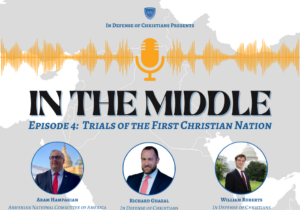April 24 marked the 106th anniversary of the 1915–23 Armenian Genocide, which Ottoman Turkey committed. This genocide resulted in the systematic extermination of around 1.5 million Armenians. Meanwhile, Azerbaijan—with Turkey’s full support—continues its ethnic cleansing of Armenians on their indigenous land in the Republic of Artsakh (Nagorno-Karabakh) in the South Caucasus.
Azerbaijani servicemen tortured and killed 19 Armenian prisoners after the end of last year’s 44-day war, lawyers Artak Zeynalyan and Siranush Sahakyan announced on May 3.
From September 27 to November 10 of last year, Azerbaijan and its ally Turkey bombed Artsakh. During these 44 days, Azeri and Turkish forces destroyed homes and other civilian targets. They murdered thousands of Christian Armenians and displaced about 100,000. Turkey also sent Azerbaijan mercenaries from Syria who had known affiliations to Islamic radical groups. Not only did these mercenaries personally testify to these details, but it was also confirmed by a United Nations report and several international media outlets.
The organization Democracy Today has documented the war crimes committed during that period:
Politics of hatred, carried out by Azerbaijan over the last three decades, shaped the entire strategy of the 2020 war: direct and indiscriminate attacks on the civilian population killed and uprooted over 100,000 people from their homes and left over 40,000 homeless.
The forces attacked journalists and aid workers, targeting and destroying Cathedral, schools, and hospitals, and used sophisticated drones, weapons of mass destruction, and cassette munitions. Using white phosphorus, they aimed to not only kill the populace, but to burn ancient forests and livestock and to destroy human habitat. When mercenaries from Syria were recruited to join the attack, the war turned more merciless with beheadings and mutilations of the bodies of civilians, and torture and humiliation of the POWs [prisoners of war].
The war was suspended following the November 9 ceasefire agreement, brokered by Russia, between Armenia and Azerbaijan. This agreement forced Armenians to relinquish much of their homeland in Artsakh to Azerbaijan by December 1.
Almost six months after the suspension of the war, Azerbaijan is still holding an estimated 200 Armenian prisoners of war, including civilian captives. Their refusal to release these POWs is in violation of international law and the November 9 agreement.
The Human Rights Defender of Armenia (HRDA)—Ombudsman Arman Tatoyan—has published an evidence-based special report on the “treatment of the Armenian prisoners (servicemen and civilians) in Azerbaijan (with focus on their questionings).” In particular, the report presents the atrocities of the Azerbaijani armed forces, which among other things, were accompanied by torture as well as the indignation and humiliation of the Armenian prisoners.
Prominent human rights lawyer Garo Ghazarian said:
The report places particular emphasis on their interrogation in Azerbaijan, concluding that the information provided by the Armenian prisoners cannot serve as a basis for criminal prosecution against them, nor could it have any probative value in international organizations and venues. On the contrary, Azerbaijani investigation services launched criminal proceedings against Armenian POWs and civilians, which is by all accounts based on confessions obtained by duress, coercion and through physical and emotional abuse of the Armenians in captivity.
Furthermore, the monitoring and investigation of complaints addressed to the Human Rights Defender Tatoyan by families of Armenians held in Azerbaijan have already shown that all of this is being done to cause mental suffering to the families of the captives and to the Armenian society in general, so as to play with emotions of the Armenian society, and to increase tension in Armenia and Artsakh.
Unsurprisingly, however, the perpetrators remain proud. At a “victory parade” in the Azerbaijani capital of Baku last year, Recep Tayyip Erdogan honored the legacy of Enver Pasha, one of the chief architects of the Armenian Genocide, and his “Islamic Army of the Caucasus,” which cooperated with Azerbaijani nationalists in 1918 to carry out an ethnic cleansing against Armenians in Baku.
These two countries have not stopped targeting Armenians. Erdogan falsely claimed in his speech on April 26 that today’s Armenia is located on land that previously had an over 80 percent Muslim population 100 years ago. “However, there is almost no one left from the Muslims, consisting of Turkish and Circassian population, in the region,” he said. Similarly, during his speech at Baku’s “victory parade,” Azeri President Ilham Aliyev also falsely claimed that the Armenian capital of Yerevan, Armenia’s Lake Sevan, and the Syunik (Zangezur) region in southern Armenia are “historic lands of Azerbaijan.”
Azeri forces are now infiltrating land in Armenia’s Syunik region. The Armenian government has recently announced that 250 Azerbaijani troops are currently invading Armenian soil, and sought help from the Collective Security Treaty Organization (CSTO), of which Armenia is a member. US Senate Foreign Relations Committee Chairman Bob Menendez issued a statement in reaction to reports of Azerbaijan’s illegal incursion into Armenia’s Syunik province. “The violation of Armenia’s sovereign territory by Azerbaijani troops is a dangerous and illegal act of aggression that underscores the sustained threat that the Armenian people continue to face,” Menendez said.
Turkey and Azerbaijan’s murderous assault against Armenians is mainly propelled by the traditional Turkish and Azeri genocidal hatred against Armenians and Christianity, and their ambition of pan-Turkist expansionism, which Turkey also calls the Red Apple doctrine.
One month before Azerbaijan and Turkey attacked Artsakh, the director of communications of the Turkish presidency, Fahrettin Altun, shared a video of the Red Apple Anthem on his Twitter account on August 24.
The Red Apple image is an important element of Turkish nationalism that symbolizes conquest, world domination, or Turkish unity. According to Red Apple ideology, the presence of Armenians in Artsakh and Armenia is an obstacle to establishing a Turkic Islamic corridor among Azerbaijan, Turkey, and other Turkic Muslim countries. This goal was openly expressed by Fariz Ismailzade, vice-rector of a university in Azerbaijan, in a Twitter post in which he referred to Armenia as an “artificial” country that stands in the way of Turkic unity.
Azerbaijan’s genocidal ideology is fueled by the institutionalized propaganda it deploys against Armenians. In January, for instance, Azermarka, a state company under the Azeri Ministry of Transport, Communications, and High Technologies, issued postage stamps entitled “Azerbaijan 2020.” In the stamps, Azerbaijan is seen “disinfecting” Artsakh, using the imagery of vermin and disease to dehumanize Armenians. In April, Azerbaijan opened an outdoor museum-park called “The Spoils of War Park” in Baku, visited by Aliyev. Hundreds of helmets of killed Armenian soldiers were displayed in the park along with other seized military equipment. Also present were wax mannequins of injured Armenian soldiers and chained captives.
“The Azerbaijani government’s behavior throughout and following their military attack should be seen in the context of their State supported Armenophobia, animosity, and ethnically motivated crimes against Armenians,” Ghazarian said. “All of these have been encouraged by Azerbaijani authorities and already confirmed by several judgments of the European Court of Human Rights.”
Azerbaijan continues to flagrantly disrespect the core principles of human rights, Ghazarian added. “Taking into consideration the recent ECHR decision, failure to release the prisoners still held in Azerbaijan is nothing less than a challenge to the credibility of the European human rights system, and in particular, to the mandate of the Council of Europe,” the lawyer added.
“Azerbaijan has violated the ‘right to life’ and the absolute ‘prohibition of torture’ in its conduct related to Armenian prisoners it has held and continue to hold in its jails. It has and continues to commit war crimes against both POWs as well as civilians in its custody to date.”
One hundred and six years after the 1915 Armenian Genocide, before the eyes of the entire world, Turkey and Azerbaijan appear hell-bent on continuing their ethnic cleansing against Armenians in their ancient homeland.







 Sponsor a student for Christianity & National Security 2024
Sponsor a student for Christianity & National Security 2024